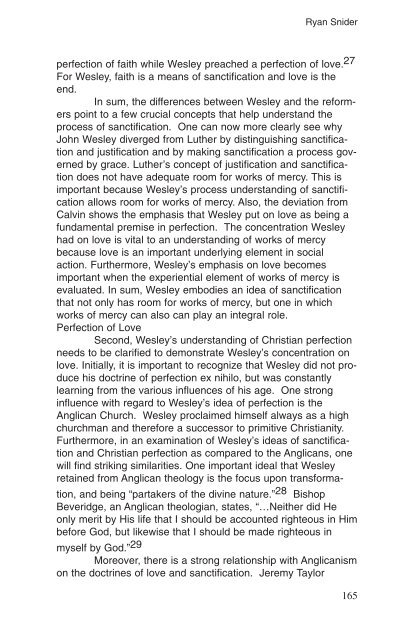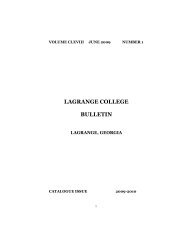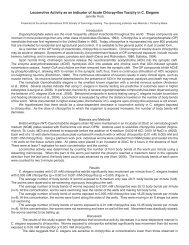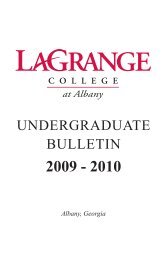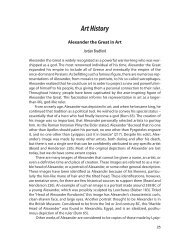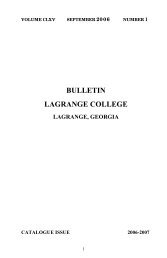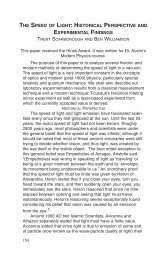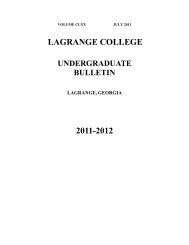Works of Mercy as a Vital Component to Sanctification - LaGrange ...
Works of Mercy as a Vital Component to Sanctification - LaGrange ...
Works of Mercy as a Vital Component to Sanctification - LaGrange ...
Create successful ePaper yourself
Turn your PDF publications into a flip-book with our unique Google optimized e-Paper software.
Ryan Snider<br />
perfection <strong>of</strong> faith while Wesley preached a perfection <strong>of</strong> love. 27<br />
For Wesley, faith is a means <strong>of</strong> sanctification and love is the<br />
end.<br />
In sum, the differences between Wesley and the reformers<br />
point <strong>to</strong> a few crucial concepts that help understand the<br />
process <strong>of</strong> sanctification. One can now more clearly see why<br />
John Wesley diverged from Luther by distinguishing sanctification<br />
and justification and by making sanctification a process governed<br />
by grace. Luther’s concept <strong>of</strong> justification and sanctification<br />
does not have adequate room for works <strong>of</strong> mercy. This is<br />
important because Wesley’s process understanding <strong>of</strong> sanctification<br />
allows room for works <strong>of</strong> mercy. Also, the deviation from<br />
Calvin shows the emph<strong>as</strong>is that Wesley put on love <strong>as</strong> being a<br />
fundamental premise in perfection. The concentration Wesley<br />
had on love is vital <strong>to</strong> an understanding <strong>of</strong> works <strong>of</strong> mercy<br />
because love is an important underlying element in social<br />
action. Furthermore, Wesley’s emph<strong>as</strong>is on love becomes<br />
important when the experiential element <strong>of</strong> works <strong>of</strong> mercy is<br />
evaluated. In sum, Wesley embodies an idea <strong>of</strong> sanctification<br />
that not only h<strong>as</strong> room for works <strong>of</strong> mercy, but one in which<br />
works <strong>of</strong> mercy can also can play an integral role.<br />
Perfection <strong>of</strong> Love<br />
Second, Wesley’s understanding <strong>of</strong> Christian perfection<br />
needs <strong>to</strong> be clarified <strong>to</strong> demonstrate Wesley’s concentration on<br />
love. Initially, it is important <strong>to</strong> recognize that Wesley did not produce<br />
his doctrine <strong>of</strong> perfection ex nihilo, but w<strong>as</strong> constantly<br />
learning from the various influences <strong>of</strong> his age. One strong<br />
influence with regard <strong>to</strong> Wesley’s idea <strong>of</strong> perfection is the<br />
Anglican Church. Wesley proclaimed himself always <strong>as</strong> a high<br />
churchman and therefore a successor <strong>to</strong> primitive Christianity.<br />
Furthermore, in an examination <strong>of</strong> Wesley’s ide<strong>as</strong> <strong>of</strong> sanctification<br />
and Christian perfection <strong>as</strong> compared <strong>to</strong> the Anglicans, one<br />
will find striking similarities. One important ideal that Wesley<br />
retained from Anglican theology is the focus upon transformation,<br />
and being “partakers <strong>of</strong> the divine nature.” 28 Bishop<br />
Beveridge, an Anglican theologian, states, “…Neither did He<br />
only merit by His life that I should be accounted righteous in Him<br />
before God, but likewise that I should be made righteous in<br />
myself by God.” 29<br />
Moreover, there is a strong relationship with Anglicanism<br />
on the doctrines <strong>of</strong> love and sanctification. Jeremy Taylor<br />
165


